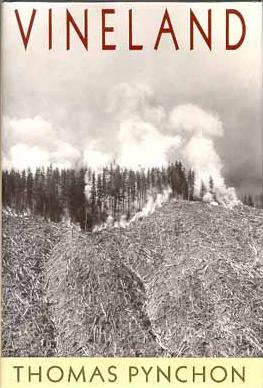
I slogged through Thomas Pynchon’s Vineland (1990) over the past couple of weeks.
Vineland is about systematic repression – of unions, of the revolutionary spirit of the psychadelic 60s, even of law enforcement itself as the Hoover-Nixon heyday of the 70s gave way to fiscal austerity in Reagan’s 80s. After reading it, I think I understand better what it might have felt like to live through the end of the dream of the 60s.
Its narrative style, floating freely across a cast of hippies, minor mafia figures, tow truck drivers, ninjas, and so on from paragraph to paragraph reminds me of the roving camera in Robert Altman’s Nashville (1975). But where Nashville observes a close unity of time, a couple of days starting with the hippies coming to town and ending with a political assasination, Vineland covers a broad swath of the history of the West Coast, from FDR to Reagan.
It took a while for me to get into the right mindset for reading this, which is generally to take Pynchon as a kind of drunken uncle who is, uh, making a point with hyperbole: “The house was so old that all of its termite clauses and code violations had been waived, on the theory that the next moderate act of nature would finish it off.”
Under the corn – the beach! Pynchon’s lyricism is often the main point and what compelled me to keep going. Following that quip about acts of nature, this gorgeous evocation:
But having been put up back during an era of overdesign, it proved to be sturdier than it looked, with its old stucco eaten at to reveal generations of paint jobs in different beach-town pastels, corroded by salt and petrochemical fogs that flowed in the summers onshore up the sand slopes, on up past Sepulveda, often across the then undeveloped fields, to wrap the San Diego Freeway too.
The book was a mood. I’d recommend it if you liked Inherent Vice and don’t particularly value tight plotting.